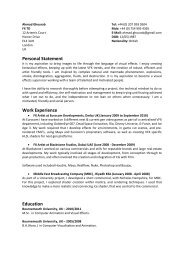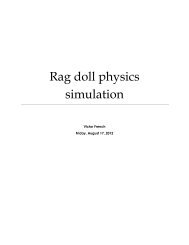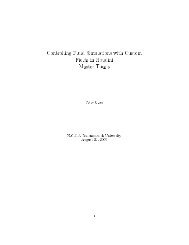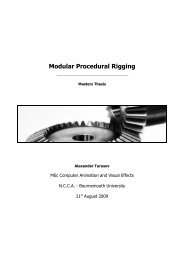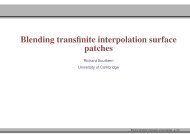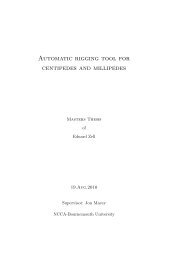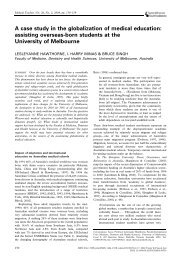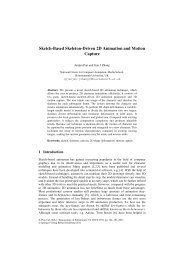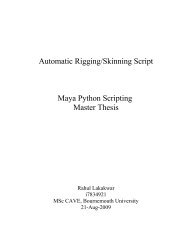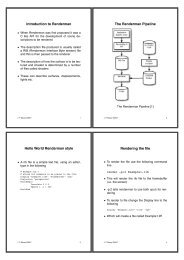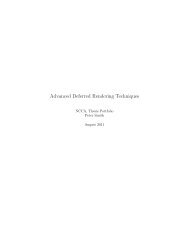The RenderMan Interface - Paul Bourke
The RenderMan Interface - Paul Bourke
The RenderMan Interface - Paul Bourke
- No tags were found...
Create successful ePaper yourself
Turn your PDF publications into a flip-book with our unique Google optimized e-Paper software.
Arrays<br />
<strong>The</strong> characters ‘[’ and ‘]’ are self-delimiting tokens that specify the construction of an array<br />
of numbers or strings. An array cannot contain both numbers and strings. If an array<br />
contains at least one floating point value, all integer values in the array are converted to<br />
floating point. Arrays of numbers are used, for example, to specify matrices and points.<br />
Arrays of strings are used in specifying options.<br />
Binary encoding<br />
For efficiency, compressed binary encodings of many types of data are also supported.<br />
<strong>The</strong>se encodings may be freely intermixed with the normal ASCII strings. <strong>The</strong> two encodings<br />
are differentiated by the top bit of the eight-bit bytes in the input stream. If the top bit<br />
is zero, then the byte is interpreted as a 7-bit ASCII character. Otherwise, if the top bit is<br />
one, the byte is interpreted as a compressed token according to the rules given below. This<br />
differentiation is not applied within string constants or the parameter bytes which follow<br />
the initial byte of a compressed token. Table C.1 shows the encoding for compressed tokens<br />
with all byte values displayed in octal.<br />
Values Span Interpreted as...<br />
0–0177 128 ASCII characters<br />
0200–0217 16 encoded integers and fixed-point numbers<br />
0220–0237 16 encoded strings of no more than 15 characters<br />
0240–0243 4 encoded strings longer than 15 characters<br />
0244 1 encoded single precision IEEE floating point value<br />
0245 1 encoded double precision IEEE floating point value<br />
0246 1 encoded RI request<br />
0247–0307 32 nothing (reserved)<br />
0310–0313 4 encoded single precision array (length follows)<br />
0314 1 define encoded request<br />
0315–0316 2 define encoded string token<br />
0317–0320 2 interpolate defined string<br />
0321–0377 46 nothing (reserved)<br />
Table C.1: Binary Encoding<br />
Four separate data types are supported: signed integers, signed fixed-point numbers, strings,<br />
and floating-point numbers. Integers and fixed-point numbers are encoded using a single<br />
format while strings are encoded with two different formats according to the length of<br />
the string. Both single- and double-precision IEEE format floating-point numbers are supported.<br />
Strings that are used repeatedly can be defined and then subsequently referenced<br />
with a compact form that is usually more space efficient.<br />
Arrays of floating-point values are directly supported for efficiency (they can also be specified<br />
using the array definition symbols). Single-precision matrices (arrays of 16 floatingpoint<br />
values) can be specified in a total of 66 bytes, while other arrays may require slightly<br />
more.<br />
177



